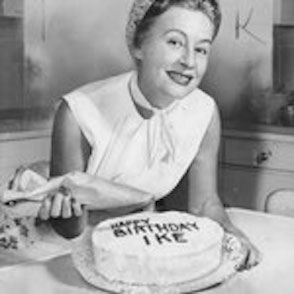
Just weeks before the 1956
presidential election, actress
Irene Dunne poses with a special
Ike Day birthday cake.
Liking Ike: Eisenhower, Advertising, and the Rise of Celebrity Politics examines the prominent role that celebrities and advertising agencies played in Dwight Eisenhower’s presidency. Guided by Madison Avenue executives and television pioneers, Eisenhower cultivated famous supporters as a way of building the kind of broad-based support that had eluded Republicans for twenty years.
It is customary to see the charismatic John F. Kennedy and his Rat Pack entourage as the beginning of presidential glamour in the United States, but from Kate Smith and Irving Berlin to Jimmy Stewart, Nat King Cole, and Helen Hayes, celebrities regularly appeared in Eisenhower’s campaigns. Ike’s political career was so saturated with celebrity that opponents from the right and left accused him of being a “glamour” candidate.

An ardent golfer,
President Eisenhower posed
with a young Arnold Palmer
in 1960 at Augusta National Golf Club.
Based on original interviews and long-neglected archival materials, Liking Ike explores the changing dynamics of celebrity politics as Americans adjusted to the television age. By the mid-1920s, entertainers were routinely drawing publicity to their favorite candidates. But with the rise of television and mass advertising, political advisers began to professionalize the attention Hollywood, Broadway, and athletic stars could bring to presidential campaigns. In meetings, memos, and television scripts, they charted a strategy for “leavening” political programming with celebrity interviews, musical performances, and elaborate “television spectaculars” that would surround their candidates with beautiful sets and popular personalities. Ike’s legacy would inform the subsequent careers of John F. Kennedy and Ronald Reagan.
